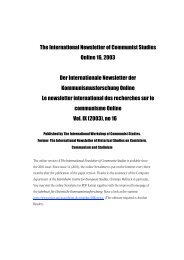Vol. XIII (2007), no 20 - The International Newsletter of Communist ...
Vol. XIII (2007), no 20 - The International Newsletter of Communist ...
Vol. XIII (2007), no 20 - The International Newsletter of Communist ...
Erfolgreiche ePaper selbst erstellen
Machen Sie aus Ihren PDF Publikationen ein blätterbares Flipbook mit unserer einzigartigen Google optimierten e-Paper Software.
<strong>The</strong> <strong>International</strong> Newletter <strong>of</strong> <strong>Communist</strong> Studies Online <strong>XIII</strong> (<strong><strong>20</strong>07</strong>), <strong>no</strong> <strong>20</strong> 35<br />
movements and their role in assuring the triumph <strong>of</strong> Bolshevism is, in short, simply waiting to<br />
be written. 72<br />
Lest we forget, the Bolsheviks, unlike the Nazis, won their war against the world in the first<br />
half-decade after the Russian Revolution, establishing a firm hold on power which would<br />
endure for three-quarters <strong>of</strong> a century. Whereas many Nazis faced a day <strong>of</strong> judgment for<br />
their crimes, <strong>no</strong> such fate was in store for Bolshevism after 1922. Although many <strong>of</strong> Lenin’s<br />
associates would later feel the wrath <strong>of</strong> Stalin when he turned on the “Old Bolsheviks,” the<br />
Russian <strong>Communist</strong> Party itself has never, to this day, faced its own Nuremberg.<br />
Here, perhaps, we are getting closer to an explanation for the gross disparity in attention<br />
paid to Nazi and Bolshevik wartime finances. <strong>The</strong>re is little joy in chronicling an ill-fated<br />
Entente blockade <strong>of</strong> Soviet Russia which failed so miserably to dislodge or contain Bolshevism.<br />
Any glory in accounts <strong>of</strong> the Allied intervention, and the Russian Civil War more generally,<br />
was on the Soviet side. Little wonder the once-hysterical obsession in Entente statehouses<br />
with Bolshevik gold movements, and the menace to western civilization they represented,<br />
slipped rapidly down the memory hole. In historiography, as in democratic politics, victories<br />
will have many proud chroniclers; a crushing defeat, like the Allies suffered in trying to<br />
quarantine Soviet Russia and its global influence, will remain a scholarly orphan.<br />
It is time to rescue the orphan. Now that the Russian archives are open, the last piece in the<br />
puzzle <strong>of</strong> Bolshevik gold movements has fallen into place. My forthcoming book aims to<br />
introduce readers to this long-forgotten subject, which holds the key to the greatest mystery<br />
<strong>of</strong> the Russian Revolution: how the Bolsheviks, despite facing a world <strong>of</strong> enemies and<br />
producing <strong>no</strong>thing but eco<strong>no</strong>mic ruin in their path, were able to stay in power. <strong>The</strong> story will<br />
be narrated as a historical drama in two acts. In the first, we shall learn how the Bolsheviks<br />
came into possession <strong>of</strong> what had (until recently) been the world’s largest gold reserve in<br />
1917-1918, and how this hoard was then enlarged, as armed detachments fanned out across<br />
Russia to fulfill Marx’s injunction to “expropriate the expropriators!”: breaking open safe<br />
deposit boxes in “nationalized” banks, withdrawing hundreds <strong>of</strong> millions <strong>of</strong> Tsarist rubles from<br />
other people’s savings accounts, looting landed estates, churches, and monasteries, and<br />
prying precious stones and other valuables from the bloodied bodies <strong>of</strong> anyone who dared<br />
resist Bolshevik confiscations. To the Imperial gold reserve was thus added money, bonds,<br />
watches, platinum, diamonds, jewelry, silverware, precious paintings, icons, engraved books:<br />
the wealth <strong>of</strong> a continent, built up over generations.<br />
Once in possession <strong>of</strong> the colossal patrimony <strong>of</strong> Tsarist Russia, we shall see in the book’s<br />
second act, the Bolsheviks proceeded to dump the bulk <strong>of</strong> it as fast as they could, at well<br />
below market rate, to anyone who would buy. <strong>The</strong> reason for haste was simple. Surrounded<br />
by enemies both real and imagined, the Bolsheviks needed to arm their supporters to the<br />
teeth first to survive, and then to perpetuate their hold on power. With breathtaking<br />
audacity, they transformed the accumulated wealth <strong>of</strong> centuries into the sinews <strong>of</strong> class war:<br />
72 Interestingly, though, the problem <strong>of</strong> White gold and silver movements during the Civil War has found<br />
an able chronicler in Oleg Budnitsky, who wrote a three-part series on the subject for Diaspora between<br />
<strong>20</strong>02 and <strong>20</strong>04: “Kolchakovskoe zoloto,” Diaspora vol. 4 (<strong>20</strong>02), pp. 457-508; “Natsional’nyi fond,”<br />
Diaspora vol. 5 (<strong>20</strong>03), pp. 283-332; and “Generalyi i den’gi, ili ‘Vrangelevskoe Serebro,” Diaspora vol. 6<br />
(<strong>20</strong>04), pp. 134-173. Although his study sheds little light on Bolshevik gold movements, Budnitsky’s<br />
series will likely remain the final word on the murky finances <strong>of</strong> Kolchak and Wrangel.














